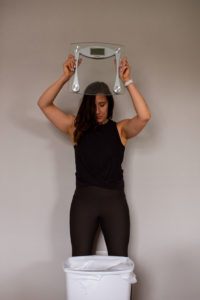Guest Blog by Samantha Lazar, Dietetics Student
There’s no way around it: protein reigns supreme when it comes to growing your muscles, building strength, and keeping your body healthy. As fitness lovers and athletes, we’re working our bodies at a higher intensity, and we have to take in more protein than the average human. Luckily, our bodies pay us back for it by getting stronger, performing better, and building a healthy body composition.
Sometimes it’s not so simple to get all the protein we need in our regular meals for the day, and you’ve probably seen a lot of athletes with their trusty tub of protein powder not far behind. This is a great option to add some extra protein in your day, but there are SO many different options on the market! It can be pretty wild and confusing to jump into that world without any guidance.
Let’s explore a few hot protein powders you’ll see in any health food store: dairy (whey and casein), vegan (soy and pea), and collagen. Are there actually real differences other than the name? And which is actually going to work for you? Let’s dive in.
Animal Protein Sources
Whey
When it comes to protein powders, whey protein has got to be the old reliable. It’s one of the most common and most popular, and for good reason!
Whey is made from cow’s milk. We must remember that protein sources from animals are what we call complete proteins. They are made up of all of the essential amino acids that your body needs because it cannot make them on its own. What’s more, whey has the specific amounts of these amino acids that your body needs in order to digest the protein fast, break it down into the smaller components your body uses, and then uses every last bit of it for muscle building and tissue repair.
Don’t forget that whey does come from dairy, and if you’re lactose intolerant, you want to make sure you’re reading the labels well. There are two types of whey protein you’ll see at the store: whey concentrate and whey isolate. Whey isolate cuts everything else out, including the lactose, so isolate is the only way to go for any of you lactose-free athletes out there! If you’re not lactose intolerant, concentrate will work just fine for you. It’s got all the same positive effects on your body as isolate, but is going to be a little less expensive since they don’t have to filter out those dairy components.
Casein
Casein protein is similar to whey in that it also comes from dairy—and because of that, it’s a complete protein as well! Research shows that it is just as efficient as whey for your body to break down and use in muscle and tissue repair.
The main difference between these two options? Casein specifically allows for slower digestion in the body and slower release of those important amino acids. So while the faster-processing whey might be ideal for immediately after a workout, casein is going to be the slow and steady that your body loves for the rest of the time.
Collagen
Collagen protein, instead of being from milk or a plant, comes from the actual hide of an animal—usually cow or pig. The conversation around collagen has exploded in the past couple of years, with tons of companies coming out with new collagen products. Some companies even market a “vegan” collagen, but to be clear vegan collagen does not exist, and is always going to come from an animal source.
One thing to remember is that collagen protein is totally different than your other options above. There’s still tons of research being done on this trendy topic, but the current verdict is: we can’t rely on collagen as our main tool to build muscle. Just like the vegan options, it is not a complete protein, but even more, its profile as a protein simply doesn’t serve the same purpose in our body.
Even though we can’t use collagen for muscle building, that’s not to say it doesn’t have some uses for us! Collagen is a very specific protein that helps with cell structure, and our bodies produce it internally, and as we get older, our collagen production can go down. This is the scenario where adding collagen protein into your diet might help.
When your body is not producing as much collagen, taking in a little extra can help promote healthy hair, skin, and nails. Some studies suggest that taking collagen might help encourage tendon strength, if you struggle with tendinitis pain—and it can also help us maintain strong bones as we get older. The problem is that the science on this specific protein is somewhat limited, so we cannot truly confirm that consuming collagen or collagen rich foods increases levels of collagen in your body.
Interesting fact: research has shown that taking in vitamin C with your collagen can help promote faster healing and more collagen production within the body. So instead of mixing this in your coffee like all of the influencers, try adding it to a fruit or vegetable smoothie!
Vegetarian Protein Sources
Even though whey has a lot of positives, it’s still a product that comes from animals—and no matter whether it’s for animal rights, conservation, or other reasons, more and more of us are trying to go plant-based or vegan.
We need to be mindful when we pick vegan proteins because, since they don’t come from animal products, a lot of them don’t have that complete protein profile we were talking about earlier. If the protein doesn’t contain every essential amino acid, and we aren’t taking in other foods that are considered complimentary proteins (they contain the essential amino acids the other is lacking) our body won’t be able to use the protein as protein at all. Peas and rice protein are examples of complimentary protein sources.
There are two vegan proteins we’re going to focus on: soy and pea. These are two of the most popular on the market today, and are easy to find in your local nutrition shop.
Soy
The good news is that soy is a vegan protein that is also a complete protein! The catch: it’s the only vegan one that is, so there aren’t a ton of comparable options.
If you’re trying to avoid animal products in your diet, soy is a great option. Studies show that it is almost just as useful for your body as whey. The negatives? It doesn’t digest quite as fully as whey, and an amino acid that’s super important for muscle-building, leucine, is found in much lower levels in soy. With both of these obstacles in mind, we need to consume more protein powder to get the same level of effectiveness out of soy compared to whey. Still very doable, but not quite as efficient for your meal planning or your wallet!
Pea
This option is newer on the scene and is a hot topic for vegans in the strength training world. Peas are a legume like beans, so they are higher in protein than your average plant!
The downside? Pea protein is not a complete protein. It’s missing some of those essential amino acids, so if it was completely on its own, our body wouldn’t be able to use it as the protein your body needs. Instead it will go to waste.
To get our full protein needs for the day, we would need to pair it with other foods (complimentary protein sources) that have the specific amino acids that pea protein is missing. Nuts, seeds, chickpeas, oats, or lentils will do the trick! Totally doable, but it takes a lot more planning and specifics throughout your day.
While pea protein is an exciting new variety to try, it doesn’t digest as well in our bodies, and to get the same effectiveness we’d have to, once again, take in a lot more for one “serving” just to equal the effectiveness of whey. If you’re going to go the vegan route for your muscle gains, I recommend soy protein between these two, but it’s great to learn more about everything that is on the market nowadays.
Protein Powder Recommendations
Whey:
Ascent Protein
SFH Protein
Lifetime Fitness Whey
Legion Athletics
Naked Whey
Vegetarian:
Lifetime Fitness Vegan
Legion Athletics Plant +
Naked Pea Protein
Collagen:
Lifetime Fitness Collagen
Vital Proteins
Great Lakes
The moral of the story
Choosing the right protein for you is a personal decision. Although it’s easy to just say that whey is scientifically the “best,” life is not black and white! And that’s okay. So many other lifestyle factors go into what is really the best FOR YOU. If you’re a vegan, whey protein is not going to be the best FOR YOU.
Just like we say about meal plans and sport training, in the long run, the option that is the best for YOU is going to be the one you can genuinely stick with and commit to, day in and day out. Take some time and think about your lifestyle, any food intolerances, and what you honestly will or will not eat. Of the options we talked about above, the best option for YOU is going to be the one that fits in to your diet and your lifestyle—because that’s the one you’ll be able to stick with in the long run and, in time, see the results come in!
Samantha Lazar is a senior nutrition and dietetics student at the University of Alabama. Outside of her schoolwork, she works as a marketing coordinator in the coffee industry and trains in Olympic weightlifting. She hopes to one day work in the field of sports nutrition.
References
Hoffman JR, Falvo MJ. Protein – Which is Best?. J Sports Sci Med. 2004;3(3):118-130. Published 2004 Sep 1.
Berrazaga I, Micard V, Gueugneau M, Walrand S. The Role of the Anabolic Properties of Plant- versus Animal-Based Protein Sources in Supporting Muscle Mass Maintenance: A Critical Review. Nutrients. 2019;11(8):1825. Published 2019 Aug 7. doi:10.3390/nu11081825
Deane C, Bass J, Crossland H, Phillips B, Atherton P. Animal, Plant, Collagen and Blended Dietary Proteins: Effects on Musculoskeletal Outcomes. Nutrients. 2020;12(9):2670. doi:10.3390/nu12092670



